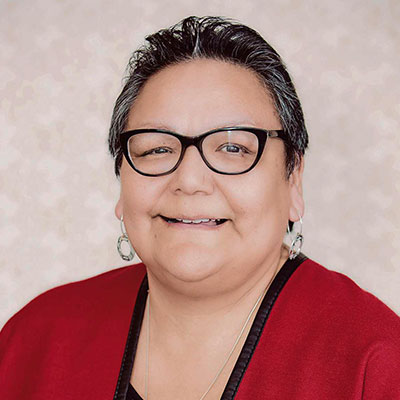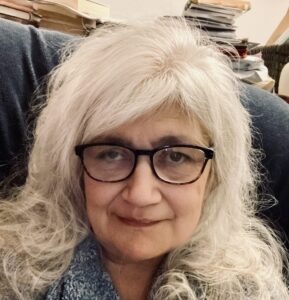
I was born and raised in Winnipeg, which is where I call home. I am an Anishinaabe woman with family and community connections to Dauphin River First Nation, which is located in the Interlake region of Manitoba about four hours northeast of Winnipeg. I was not raised in my home community; however, I do have connections to Chief and Council and all my relations in Dauphin River.
I am an educator. I graduated from the University of Manitoba with a Bachelor’s degree in Education (1987) and a Master’s degree in Education (2014). My expertise is in inner city education and Indigenous education. I have spent my career working in inner city schools in Winnipeg, working for the Department of Education as a consultant and later as Director of Indigenous Education, a position that I have held since 2006.
I am a wife and mother of two sons, Craig and Kevin. My son Kevin has lived with kidney disease since he was 10 years old. He was diagnosed with nephrotic syndrome and has been under the care of nephrologists since he was 11 years old. He has had various interventions until his kidneys failed in June 2010. He required a kidney transplant and used peritoneal dialysis in the interim until his kidney transplant in October 2012. His older brother Craig donated a kidney.
I am pleased to be involved with Can-SOLVE CKD, as I have been a patient supporter for Kevin since he was diagnosed with CKD as a child and living with the disease until his kidney transplant. I was introduced to Can-SOLVE CKD by Cathy Woods, and both Kevin and I were interested because we can share our experiences living with the disease. I feel I can offer advice and recommendations as CKD is an epidemic in First Nations, Métis and Inuit peoples. I feel that my experiences as a caregiver can be shared with researchers, policy makers, and medical staff working with CKD. I look forward to learning at the workshops and hearing about the advances and the research strategies for CKD.

My name is Mary Beaucage. I’m from Nipissing First Nation, outside of North Bay Ontario. I work in retail management, opening stores, recruiting, hiring and training, analyzing and forecasting sales.
I am a type 2 diabetic. As a result, my kidneys were affected. Diagnosed with End-Stage Renal Disease (ESRD) in June 2013, I started dialysis immediately, 4 hours-3x/week for 2 years.
I had several severe infections including a severe staph infection which hospitalized me for 3 weeks and a blood infection while visiting my sister in Calgary. Upon returning from a hospital stay while I was there, I had a PICC line and an 8 week regimen of IV antibiotics.
I find I had to do a lot of my own research to be my best advocate. I started my journey at stage 5, I wasn’t prepared beforehand. I took an active role in my care, and learned what I could about the machine I dialyzed on, as well as my diet and fluid restriction. I worked hard to maintain some exercise regimen, mainly walking when I had some energetic days. I tried to continue working as I started dialysis, but that lasted less than 3 weeks, when I had my staph infection. It was then I realized I wasn’t wonder woman, and something had to give.
My cousin, Janice Pulak, from Thompson MB, went through testing to see if we were a match. Thankfully, after a year everything worked out, and I had my living donor kidney transplant on March 24th, 2015.
I am passionate about educating and advocating, and as I go through my healing journey, I’m finding strength in talking to others, especially in the aboriginal and northern communities. I became involved with Can-SOLVE CKD by referral, based on my involvement in the living donor initiative. Being part of research level and feedback workshops has been very meaningful to me.
These have been key motivating factors for becoming involved with Can-SOLVE CKD.

Arlene Desjarlais joined the Can-SOLVE CKD Network as a patient partner after the loss of her husband, Glen, to chronic kidney disease. In her role as patient partner, Arlene has participated in many research groups such as the Indigenous Peoples’ Engagement and Research Council (IPERC), the KidneyPro Working Group, and the Knowledge Translation Community of Practice. Arlene has found purpose and passion in her role as a patient partner in research and, through her work, hopes to contribute to advancing knowledge and an eventual cure for CKD.

Connect with us